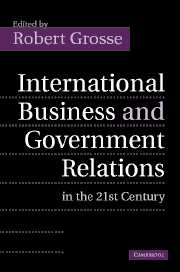Book contents
- Frontmatter
- Contents
- List of figures
- List of tables
- List of contributors
- Acknowledgments
- Introduction
- Part I History and theories of analysis of international business–government relations
- Part II The shifting international business–government partnership
- 5 Foreign direct investment and government policy in Central and Eastern Europe
- 6 Global warming and climate change: new issues for business strategy, government policy, and research on business–government relations
- 7 Business–government relations in the cultural industry: the evolution of the government's role in Korea
- 8 Multinational enterprise, public authority, and public responsibility: the case of Talisman Energy and human rights in Sudan
- 9 Direct private foreign investment in developing countries – the judo trick
- Part III Bargaining theory and the obsolescing bargain
- Part IV Host and home government views of international business
- Conclusions
- References
- Select bibliography of J. N. Behrman's works
- Index
8 - Multinational enterprise, public authority, and public responsibility: the case of Talisman Energy and human rights in Sudan
Published online by Cambridge University Press: 22 September 2009
- Frontmatter
- Contents
- List of figures
- List of tables
- List of contributors
- Acknowledgments
- Introduction
- Part I History and theories of analysis of international business–government relations
- Part II The shifting international business–government partnership
- 5 Foreign direct investment and government policy in Central and Eastern Europe
- 6 Global warming and climate change: new issues for business strategy, government policy, and research on business–government relations
- 7 Business–government relations in the cultural industry: the evolution of the government's role in Korea
- 8 Multinational enterprise, public authority, and public responsibility: the case of Talisman Energy and human rights in Sudan
- 9 Direct private foreign investment in developing countries – the judo trick
- Part III Bargaining theory and the obsolescing bargain
- Part IV Host and home government views of international business
- Conclusions
- References
- Select bibliography of J. N. Behrman's works
- Index
Summary
Recognizing that even though states have the primary responsibility to promote, secure the fulfillment of, respect, ensure respect of, and protect human rights, transnational corporations and other business enterprises, as organs of society, are also responsible for promoting and securing the human rights set forth in the Universal Declaration of Human Rights.
(United Nations Social and Economic Council, 2003, p. 1)Corporations … are increasingly being asked to step into roles that were once the domain of governments or international bodies such as the United Nations. Defining what is properly expected of a company needs to be more clearly articulated and rigorously debated.
(Jim Buckee, CEO Talisman Energy. Corporate Social Responsibility Group, 2001, p. 5)In November 2001 a $1billion class-action lawsuit was brought against Talisman Energy, a large Canadian independent oil and gas producer, on behalf of the Presbyterian Church of Sudan and a number of individual plaintiffs. The plaintiffs allege that Talisman violated the human rights of Christian and other non-Muslim minorities in Sudan as part of its oil exploration, development, and production operations in that country. Specifically, the suit accuses Talisman of conducting a campaign of ethnic cleansing to clear the land for oil operations (Wichita Global Coalition, 2001; D'Avino, 2002).
Talisman is charged with violating the human rights of Sudanese in Sudan; the alleged actions did not involve American nationals nor did they take place on American territory.
- Type
- Chapter
- Information
- Publisher: Cambridge University PressPrint publication year: 2005
- 1
- Cited by



